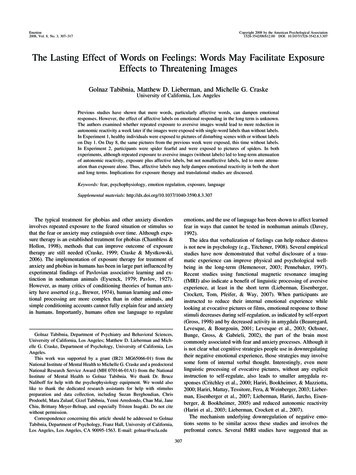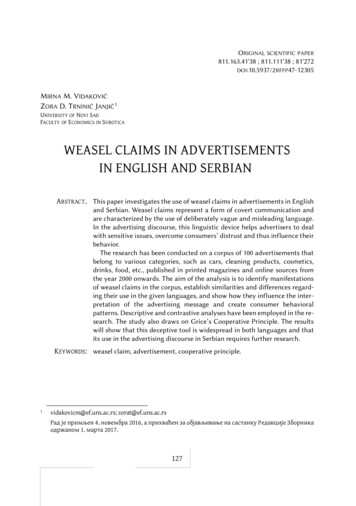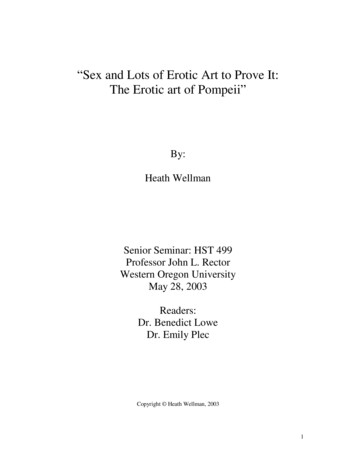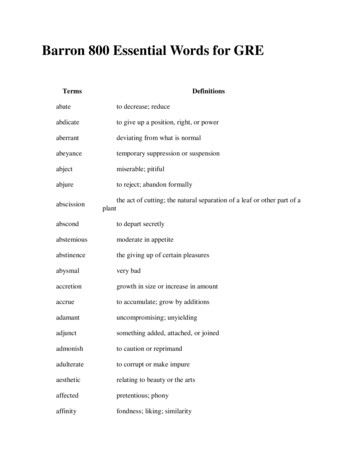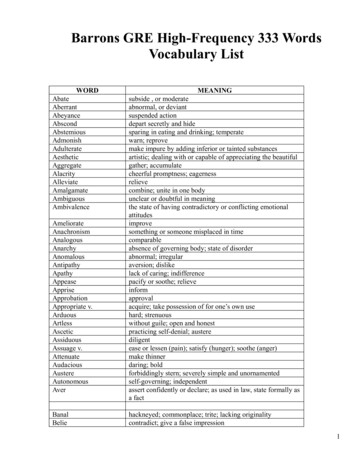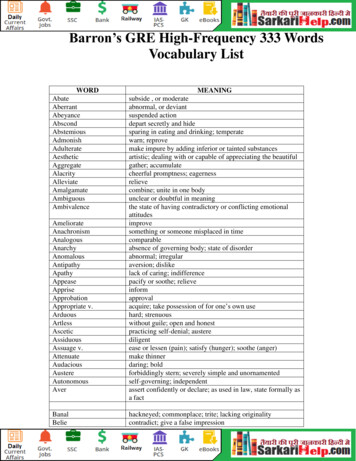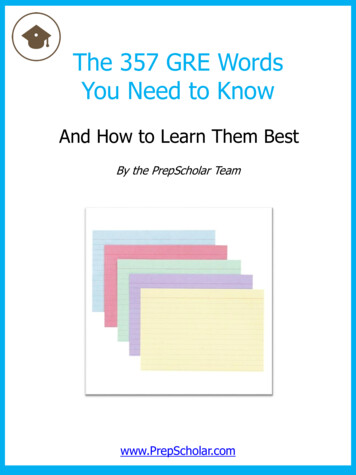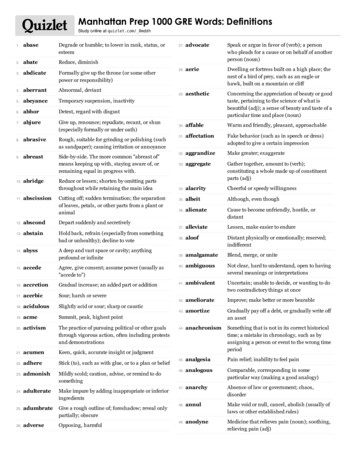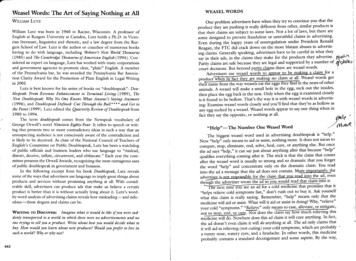
Transcription
""Weasel Words: The Art of Saying Nothing at AllWILLIAM LUTZWilliam Lutz was born in 1940 in Racine, Wisconsin. A professor ofEnglish at Rutgers University at Camden, Lutz holds a Ph.D. in Victorian literature, linguistics and rhetoric, and a law degree from the Rutgers School of Law. Lutz is the author or coauthor of numerous bookshaving to do with language, including Webster)s New World Thesaurus(1985) and The Cambridge Thesaurus of American English (1994). Considered an expert on language, Lutz has worked with many corporationsand government agencies to promote clear, "plain" English. A memberof the Pennsylvania bar, he was awarded the Pennsylvania Bar Association Clarity Award for the Promotion of Plain English in Legal Writingin 2001.Lutz is best known for his series of books on "doublespeak": Doublespeak: From Revenue Enhancement to Terminal Living (1989), TheNew Doublespeak: Why No One Knows What Anyone)s Saying Anymore(1996), and Doublespeak Defined: Cut Through the Bull * * * * and Get tothe Point (1999). Lutz edited the Quarterly Review of Doublespeak from1980 to 1994.The term doublespeak comes from the Newspeak vocabulary ofGeorge Orwell's novel Nineteen Eighty-Four. It refers to speech or writing that presents two or more contradictory ideas in such. a way that anunsuspecting audience is not consciously aware of the contradiction andis likely to be deceived. As chair of the National Council of Teachers ofEnglish's Committee on Public Doublespeak, Lutz has been a watchdogof public officials and business leaders who use language to "mislead,distort, deceive, inflate, circumvent, and obfuscate." Each year the committee presents the Orwell Awards, recognizing the most outrageous usesof public doublespeak in government and business.In the following excerpt from his book Doublespeak) Lutz revealssome of the ways that advertisers use language to imply great things aboutproducts and services without promising anything at all. With considerable skill, advertisers can produce ads that make us believe a certainproduct is better than it is without actually lying about it. Lutz's wordby-word analysis of advertising claims reveals how misleading-andridiculous-theseslogans and claims can be.,.ItImagine what it would be like if you were suddenly transported to a world in which there were no advertisements and noone trying to sell you a product. Write about how you would decide what tobuy. How would you learn about new products? Would you prefer to live insuch a world? Why or why not?WRITING TO DISCOVER:442WEASEL WORDSOne problem advertisers have when they try to convince you that theproduct they are pushing is really different from other, similar products isthat their claims are subject to some laws. Not a lot of laws, but there aresome designed to prevent fraudulent or untruthful claims in advertising.Even during the happy years of nonregulationunder President RonaldReagan, the FTC did crack down on the more blatant abuses in advertising claims. Generally speaking, advertisers have to be careful in what they"say in their ads, in the claims they make for the products they advertise. t \ I,\.Parity clai?:s are safe because th y are egal and supported by a number of 9rJ1kJcourt declSlons. But beyond p nty claIms there are weasel words.Advertisers use weasel words to a ear to be makina claim for aproduct w en m fact they are making no claim at all. Weasel words gettheir name from the way weasels eat the eggs they find in the nests of otheranimals. A weasel will make a small hole in the egg, suck out the insides,then place the egg back in the nest. Only when the egg is examined closelyis it found to be hollow. That's the way it is with weasel words in advertising: Examine weasel words closely and you'll find that they're as hollow asany egg sucked by a weasel. Weasel words appear to say one thing when infact they say the opposite, or nothing at all. ,."Help"-TheNumber One WeaselWord/The biggest weasel word used in advertising doublespeak is "help."Now "help" only means to aid or assist, nothing more. It does not mean toconquer, stop, eliminate, end, solve, heal, cure, or anything else. But oncethe ad says "help," it can say just about anything after that because "help"qualifies everything coming after it. The trick is that the claim that comesafter the weasel word is usually so strong and so dramatic that you forgetthe word "help" and concentrate only on the dramatic claim. You readinto the ad a message that the ad does not contain. M.ore importantly, thead is not respoosible for the claim that YOll read into the ad, eventhough the advertiser wrote the ad so you would read that claim into it. you see an ad for a cold medicine that promises that it"helps relieve cold symptoms fast," don't rush out to buy it. Ask yourselfwhat this claim is really saying. Remember, "help" means only that themedicine will aid or assist. What will it aid or assist in doing? Why, "relieve"your cold "symptoms." "Relieve" only means to ease, alleviate, or miti ate,not to stop, end, or cure does the claim say ow much relieving thism"edicine will do. Nowhere does this ad claim it will cure anything. In fact,the ad doesn't even claim it will do anything at all. The ad only claims thatit will aid in relieving (not curing) your cold symptoms, which are probably"a runny nose, watery eyes, and a headache. In other words, this medicineprobably contains a standard decongestant and some aspirin. By the way,{l\,:ue
what does "fast" mean? Ten minutes, one hour, one day? What is fast toone person can be very slow to another. Fast is another weasel word.Ad claims using "help" are among the most popular ads. One says,"Helps keep you yoUng looking," but then a lot of things will help keep youyoung looking, including exercise, rest, good nutrition, and a facelift. Moreimportantly, this ad doesn't Saythe product will keep you young, only "younglooking." Someone may look young to one person and old to another.A toothpaste ad says, "Helps prevent cavities," but it doesn't say it willactually prevent cavities. Brushing your teeth regularly, avoiding sugars infood, and flossing daily will also help prevent cavities. A liquid cleaner adsays, "Helps keep your home germ free," but it doesn't say it actually killsgerms, nor does it even specifYwhich germs it might kill."Help" is such a useful weasel word that it is often combined with otheraction-verb weasel words such as "fight" and "control." Consider the claim,"Helps control dandruff symptoms with regular use." What does it really say?It will assistin controlling (not eliminating, stopping, ending, or curing) thesymptoms of dandruff, not tlle cause of dandruff nor the dandruff itself Whatare the symptoms of dandruff? The ad deliberately leavesthat undefined, butassume that the symptoms referred to in the ad are the flaking and itchingcommonly associated with dandruff. But just shampooing with any shampoowill temporarily eliminate these symptoms, so this shampoo isn't any different from any other. Finally, in order to benefit from this product, you mustuse it regularly. What is "regular use" -daily, weeldy, hourly? Using anothershampoo "J;egularly"will have the same effect. Nowhere does this advertising claim say.this particular shampoo stops, eliminates, or cures dandruff. Infact, this clairnsays nothing at all, thanl,:sto all the weasel words.Look at ads in magazines and newspapers, listen to ads on radio andtelevision, and you'll find the word "help" in ads for all kinds ofprodllctS.How often do you read or hear such phrases as "helps stop . ," "helpsovercome . ," "helps eliminate . ," "helps you feel . ," or "helps youlook . "? If you start looking for this weasel word in advertising, you'll beamazed at hb often it occurs. Analyze the claims in the ads using "help,"and you will discover that these ads are really saying nothing.There are plenty of other weasel words used in advertising. In fact,there are so many that to list them all would fill the rest of this boole. But,in order to ideritifYthe doublespeak ot advertising and understand the realmeaning of an ad, YOll have to be aware of the most popular weasel wordsin advertising today.--5New and ImprovedVirtually SpotlessOne of the most powerful weasel words is "virtually," a word soinnocent tllat most people don't pay any attention to it when it is usedin an advertising claim. But watch out. "Virtually" is used in advertisingclaims that appear to make specific, definite promises when there is nopromise. After all, what does "virtually" mean? It means "in essence oreffect, although not in fact." Look at that definition again. "Virtually"means not in fact. It does not mean "almost" or "just about the same as,"or anything else. And before you dismiss all this concern over such a smallword, remember that small words can have big consequences.In 1971 a federal court rendered its decision on a case brought by awoman who became pregnant while taking birth control pills. She sued themanufacturer, Eli Lilly and Company, for breach of warranty. The womanlost her case. Basing its ruling on a statement in the pamphlet accompanyingthe pills, which stated that, "When taken as directed, the tablets offer virtually 100 percent protection," the court ruled that there was no warranty,expressed or implied, that the pills were absolutely effective. In its ruling,the court pointed out that, according to Webster)s Third New InternationalDictionary) "virtually" means "almost entirely" and clearly does not mean"absolute" (Whittington v. Eli Lilly and Company, 333 F. Supp. 98). Inother words, the Eli Lilly company was really saying that its birth controlpill, even when taken as directed, did not in fact provide 100 percent protection against pregnancy. But Eli Lilly didn't want to put it that way becausethen many women might not have bought Lilly's birth control pills.The next time you see the ad that says that this dishwasher detergent"leaves dishes virtually spotless," just remember how advertisers twist themeaning of the weasel word "virtually." You can have lots of spots on yourdishes after using this detergent and the ad claim will still be true, becausewhat this claim really means is that this detergent does not in fact leave yourdishes spotless. Whenever you see"or hear an ad claim that uses the word"virtually," just translate that claim into its real meaning. So the televisionset that is "virtually trouble free" becomes the television set that is not in facttrouble free, the "virtually foolproof operation" of any appliance becomesan operation that is in fact not foolproof, and the product that "virtuallynever needs service" becomes the product that is not in fact service free.10If "new" is the most frequently used word on a product package,"in:l?ro d" is the second most frequent. In fact, the two words are almostalways used together. It seems just about everything sold these days is"new and improved." The next time you're in the supermarket, try counting the number of times you see these words on products. But you'd better do it while you're walldng down just one aisle, otherwise you'll need acalculator to keep track of your counting.Just what do these words mean? The use of the word "new" is restrictedby regulations, so an advertiser can't just use the word on a product orin an ad without meeting certain requirements. For example, a productis considered new for about six months during a national advertisingcampaign. If the product is being advertised only in a limited test market
area, the word can be used longer, and in some instances has been usedfor as long as two years.What makes a product "new"? Some products have been around for along time, yet every once in a while you discover that they are being advertised as "new." Well, an advertiser can call a product new if there has been"a material functional change" in the product. What is "a material functional change," you ask? Good question. In fact it's such a good questionit's being asked all the time. It's up to the manufacturer to prove that theproduct has undergone such a change. And if the manufacturer isn't challenged on the claim, then there's no one to stop it. Moreover, the changedoes not have to be an improvement in the product. One manufactureradded an artificial lemon scent to a cleaning product and called it "new andimproved," even though the product did not clean any better than withoutthe lemon scent. The manufacturer defended the use of the word "new"on the grounds that the artificial scent changed the chemical formula of theproduct and therefore constituted "a material functional change."Which brings up the word "improved." When used in advertising,"improved" does not mean "made better." It only means "changed" or 'different from before." So, if the detergent maker puts a plastic pourspout on the box of detergent, the product has been "improved," and awaywe go with a whole new advertising campaign. Or, if the cereal maker addsmore fruit or a different kind of fruit to the cereal, there's an improvedproduct. Now you know why manufacturers are constantly making littlechanges in their products. Whole new advertising campaigns, designed toconvince you that the product has been changed for the better, are basedon small changes in superficial aspects of a product. The next time you seean ad for an "improved" product, ask yourself what was wrong with theold one. Ask yourself just how "improved" the product is. Finally, youmight check to see whether the "improved" version costs more than theunimproved one. After all, someone has to pay for the millions of dollarsspent advertising the improved product.Of course, advertisers really like to run ads that claim a product is"new and improved." While what constitutes a "new" product may besubject to some regulation, "improved" is a subjective judgment. A manufacturer changes the shape of its stick deodorant, but the shape doesn'timprove the function of the deodorant. That is, changing the shape doesn'taffect the deodorizing ability of the deodorant, so the manufacturer calls it"improved." Another manufacturer adds ammonia to its liquid cleaner andcalls it "new and improved." Since adding ammonia does affect the cleaning ability of the product, there has been a "material fimctional change"in the product, and the manufacturer can now call its cleaner "new," and"improved" as well. Now the weasel words "new and improved" areplastered all over the package and are the basis for a multimillion-dollarad campaign. But after six months the word "new" will have to go, untilsomeone can dream up another change in the product. Perhaps it will be15adding color to the liquid, or changing the shape of the package, or maybeadding a new dripless pour spout, or perhaps a ' The "improvements"are endless, and so are the new advertising claims and campaigns."New" is just too useful and powerful a word in advertising for advertisers to pass it up easily. So they use weasel words that say "new" withoutreally saying it. One of their favorites is "introducing," as in, "Introducingimproved Tide," or "Introducing the stain remover." The first is simplysaying, here's our improved soap; the second, here's our new advertising campaign for our detergent. Another favorite is "now," as in, "Nowthere's Sinex," which simply means that Sinex is available. Then there arephrases like "Today's Chevrolet," "Presenting Dristan," and "A fresh wayI to start the day." The list is really endless because advertisers are alwaysfinding new ways to say "new" without really saying it. If there is a secondedition of [my] book, I'll just call it the "new and improved" edition.Wouldn't you really rather have a "new and improved" edition of [my]book rather than a "second" edition?I.Acts FastI"Acts" and "works" are two popular weasel words in advertisingbecause they bring action to the product and to the advertising claim.When you see the ad for the cough syrup that "Acts on the cough controlcenter," ask yourself what this cough syrup is claiming to do. Well, it's justclaiming to "act," to do something, to perform an action. What is it thatthe cough syrup does? The ad doesn't say. It only claims to perform anaction or do something on your "cough control center." By the way, whatand where is your "cough control center"? I don't remember learningabout that part of the body in human biology class.Ads that use such phrases as "acts fast," "acts against," "acts to prevent," and the like are saying essentially nothing, because "act" is a wordempty of any specific meaning. The ads are always careful not to specifyexactly what "act" the product performs. Just because a brand of aspirinclaims to "act fast" for headache relief doesn't mean this aspirin is anybetter than any other aspirin. What is the "act" that this aspirin performs?You're never told. Maybe it just dissolves quickly. Since aspirin is a parityproduct, all aspirin is the same and therefore functions the same.Works Like Anything ElseIf you don't find the word "acts" in an ad, you will probably find theweasel word "works." In fact, the two words are almost interchangeable inadvertising. Watch out for ads that say a product "works against," "workslike," "works for," or "works longer." As with "acts," "works" is the samemeaningless verb used to make you think that this product really doessomething, and maybe even something special or unique. But "works,"like "acts," is basically a word empty of any specific meaning.20
CAN IT BE UP TO THE CLAIM?Like MagicWhenever advertisers want you to stop thinking about the productand to start thinking about something bigger, better, or more attractivethan the product, they use that very popular weasel word "like." The word"like" is the advertiser's equivalent of a magician's use of misdirection."Like" gets you to ignore the product and concentrate on the claim theadvertiser is making about it. "For skin like peaches and cream" claims thead for a skin cream. What is this ad really claiming It doesn't say this creamwill give you peaches-and-cream skin. There is no verb in this claim, so itdoesn't even mention using the product. How is skin ever like "peachesand cream" Remember, ads must be read literally and exactly, according tothe dictionary definition of words. (Remember "virtually" in the Eli Lillycase.) The ad is making absolutely no promise or claim whatsoever for thisskin cream. If you think this cream will give you soft, smooth, youthfullooking skin, you are the one who has read that meaning into the ad.The wine that claims "It's like taking a trip to France" wants you to thinkabout a romantic evening in Paris as you walk along the boulevard after awonderful meal in an intimate little bistro. Of course, you don't really believethat a wine can take you to France, but the goal of the ad is to get you to thinkpleasant, romantic thoughts about France and not about how the wine tastesor how expensive it may be. That little word "like" has taken you away fromcrushed grapes into a world of your own imaginative making. Who knows,maybe the next time you buy wine, you'll think those pleasant thoughts whenyou see this brand of wine, and you'll buy it. Or, maybe you weren't eventhinking about buying wine at all, but now you just might pick up a bottle thenext time you're shopping. Ah, the power of "like" in advertising.How about the most famous "like" claim of all, "Winston tastes goodlike a cigarette should" Ignoring the grammatical error here, you might wantto know what this claim is saying.Whether a cigarette tastes good or bad is asubjective judgment because what tastes good to one person may well tastehorrible to another. Not everyone likesfried snails,even if they are called escargot. (De gustibus non est disputandum, which was probably the Roman rulefor advertising as well as for defending the games in the Colosseum.) Thereare many people who sayall cigarettes taste terrible, other people who sayonlysome ci
Weasel words get their name from the way weasels eat the eggs they find in the nests of other animals. A weasel will make a small hole in the egg, suck out the insides, then place the egg back in the nest. Only when the egg is examined closely is it found to be hollow. That's the way it is with weasel words in advertis-ing: Examine weasel words .
